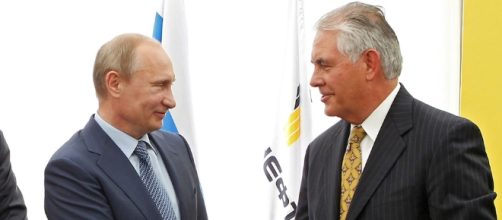In stating that relations with Russia “may be at an all time low” President Donald Trump tacitly admits the reality of a foreign policy crisis that was avoidable on the part of the White House. The decision to launch a military strike on a Russian ally was never going to solve the issue of Bashar Al-Assad and only highlighted the lack of foreign policy guidelines by an Oval Office that is about to end its honeymoon period.
Message
Secretary of State Rex Tillerson had an important appointment in Moscow on Wednesday. He was due to meet Russian President Vladimir Putin after a long meeting with the country’s Foreign Minister Sergey Lavrov.
The simple fact that America’s highest ranking diplomat was made to wait two hours for the scheduled appointment was a message to the world that the relationship between Moscow and Washington was at a crisis point.
Yet weeks ago when the Secretary of State announced that he would not attend the NATO conference for the Moscow meeting America’s allies were worried that the Oval Office had decided to relax its stance on its historic rival who was still under international sanctions as a result of its conflict with the Ukraine and the annexation of that country’s region of Crimea.
Attack
What changed the stance in the few short weeks was not just the gas attack on the Syrian rebel town of Khan Sheikhoum in Iblid province last week that led to the America’s Tomahawk strike on Syria’s Shayrat air force base in retaliation.
Up to that point President Trump seemed to prefer rapprochement with Russia to maintaining its close ties with its NATO allies. With the release of the images of dead civilians in Iblid attack, and particularly those of the children that shocked the world the Oval Office decided to act in an extraordinarily short time for such a reply.
This attack angered not only the Kremlin but also many Trump supporters who had backed him due to campaign promise that he would not undertake such actions during his term of office.
Without doubt the National Security Council in its recommendations to the President for its possible replies to the gas attack had stressed the major issue of the Syrian situation. Dictator Bashar Al-Assad is an ally of Russia and such an attack was a direct affront to Moscow.
Inconsistencies
The emotive reply to the tragedy in Khan Sheikhoum was always bound to have a negative impact on relations with Russia given that country’s previous vetoes of a U.S. sponsored motion in the UN Security Council denouncing the attack. Worse still, the attack also came as President Trump was hosting Chinese President Xi Jinping at his Mar-a-Lago resort.
This change of diplomatic direction was not the first by Donald Trump since entering office on January 20th.
Over the last nearly three months he has changed his stance with China at least three times first over the One China policy, then on trade and finally on North Korea. Finally on Wednesday President Trump praised NATO after previously stating that the United States led alliance was “obsolete”.
These changes of foreign policy are, to say the least, confusing to America’s allies and also to the public.
The contemporary plan to subject the State Department to major budget cuts and the failure to fill important positions in his Administration give the impression of a rudderless ship rather than an Oval Office with a sure direction for the country as a world leader.
While the current crisis with Russia may not be the worse between the two countries, and the simple memory of the 1962 Cuba Crisis quickly comes to mind, it is one that could deteriorate if it is not handled correctly.
Allies and foes
The only way that the White House will be able to resolve the current situation is to set a clear and precise path for future foreign policy for the country.
At the present time the constant changes of stance and attitude by the Oval Office are increasing distrust on the part of America’s international rivals and uncertainty on the part of its allies who have often planned their own foreign policy agenda on America’s ambitions.
The White House should be worried by today’s’ statements reported in the Australian press by former Australian Foreign Minister and former head of the International Crisis Group Gareth Evans at a speech in that country's National Press Club who defined President Trump as “the most ill equipped President in US history” and that Australia’s foreign policy must be “less United States, more Asia and more self reliance.”
If one of the United States staunchest allies sees the President of the United States in this way, how do America’s foes see him?

